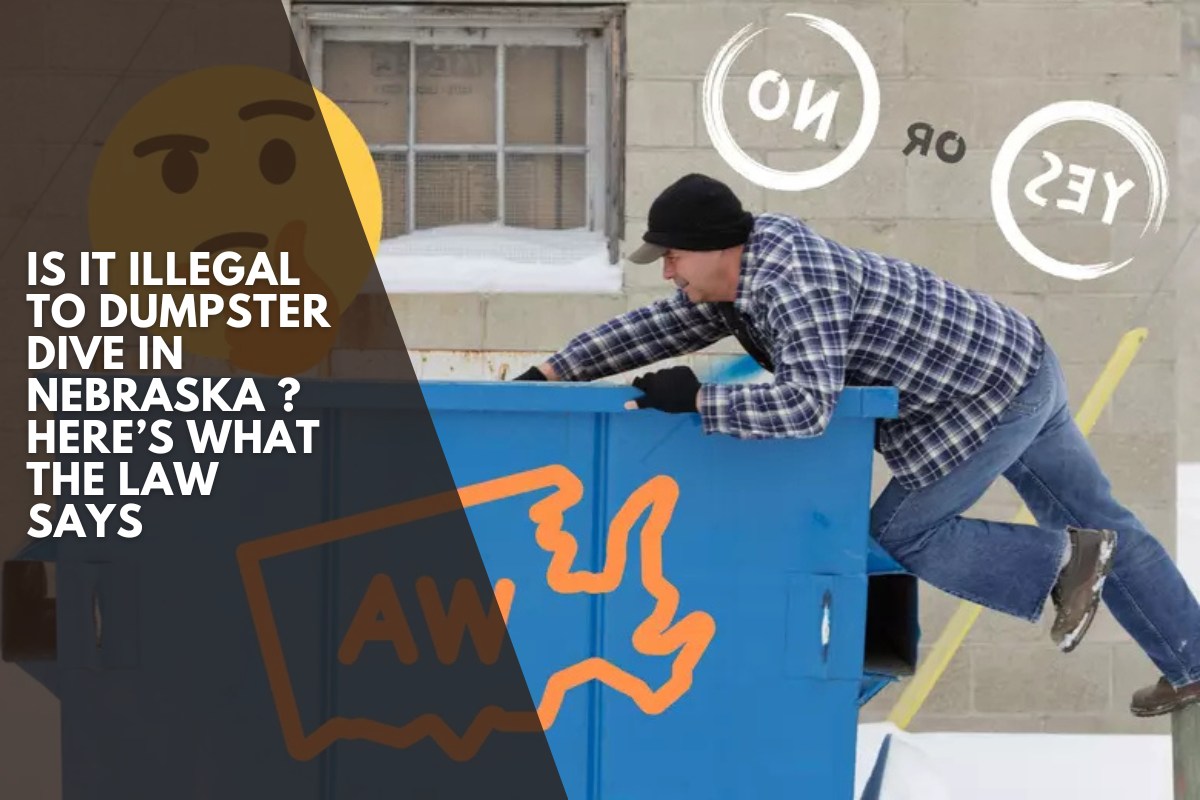Dumpster diving—searching through trash bins and dumpsters for discarded items of value—is generally legal in Nebraska as of 2025. But while statewide laws don’t explicitly ban the practice, there are key restrictions and risks involving trespassing, city codes, and property rights that every would-be diver should carefully consider.
Nebraska State Law: No Statewide Ban
There is no Nebraska state law expressly prohibiting dumpster diving. In fact, Nebraska’s leading legal precedent (State v. Holden, 1988) established that collecting discarded materials from dumpsters is not inherently illegal, as long as the act does not involve trespassing.
In that case, the Nebraska Supreme Court overturned trespassing charges against two men caught diving outside a grocery store, since the dumpsters were publicly accessible and not locked or fenced.
Where Dumpster Diving Is Legal—and Where It Isn’t
The critical legal line in Nebraska centers on trespassing and private property. You can legally look through dumpsters:
- That are placed on public property (such as alleys or curbs, open parking lots)
- If they are not behind a fence or in an area marked “No Trespassing”
- Provided you are not violating local city codes or health/safety regulations
However, if a dumpster is:
On private property (behind businesses, in apartment complexes, etc.)
Locked, fenced, or posted with “No Trespassing” signs
Located in an area where you do not have explicit permission to enter,
then searching through it could result in a trespassing citation. In Nebraska, trespassing can be prosecuted as a misdemeanor, with penalties including fines up to $1,000 and possible jail time for repeat offenses. In practice, most minor violations yield a warning or a small fine.
Local Laws and City Restrictions
City ordinances can create stricter rules:
Omaha: City codes prohibit scavenging or scattering trash from city-owned bins and prohibit trespassing in public trash receptacles. Fines start at $100 for a first offense, escalating for repeat violations.
Lincoln: It’s unlawful to loiter, canvass, or distribute materials on private property against the owner’s express wishes—even if a dumpster is accessible. Trespassing charges are enhanced for night activity and when signs are posted.
Other cities: Always check municipal codes for “scavenging” ordinances. Some cities explicitly prohibit collecting trash from curbsides or public landfills without authorization.
Sanitary landfills across Nebraska universally ban scavenging, and only authorized personnel may remove items for safety and regulatory reasons.
Best Practices for Legal Dumpster Diving in Nebraska
Stay in public areas. Only dive dumpsters you are certain are not on private property or behind locked/fenced areas.
Respect signs and property boundaries. “No Trespassing” or locked bins are off-limits.
Don’t make a mess. Scattering trash may result in littering charges.
Be discreet and courteous. If questioned by police or property owners, leave immediately and politely.
Daytime is safer. Nighttime dumpster diving is more likely to draw police attention and can increase trespassing penalties.
Potential Legal Risks Beyond Trespassing
Littering: Leaving a mess can result in fines.
Hazardous waste: Removing certain items (like chemicals or electronics) from dumpsters may be subject to environmental rules.
Private security and civil actions: Even if not charged criminally, violators can be banned from properties or face other civil actions.
Dumpster diving is not illegal in Nebraska as long as you avoid trespassing and follow local ordinances. Always remain on public property, heed posted restrictions, and respect requests to leave. Stay informed of city-specific rules before diving—and remember, if in doubt, ask for permission or move on to ensure you remain within the law.
Sources
[1] https://scrapsafari.com/dumpster-diving-in-nebraska/
[2] https://www.rolloffdumpsterdirect.com/dumpster-diving-illegal/
[3] https://codelibrary.amlegal.com/codes/sidney/latest/sidney_ne/0-0-0-17577
[4] http://govdocs.nebraska.gov/epubs/E6500/R015.0132-2008.pdf
[5] https://worldpopulationreview.com/state-rankings/dumpster-diving-legal-states
[6] https://www.legalmatch.com/law-library/article/is-dumpster-diving-illegal.html











